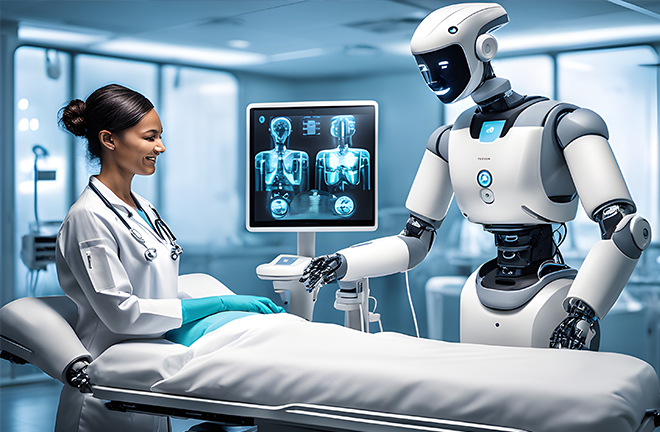Addressing AI’s impact on employment

A rendering of a medical robot Photo: TUCHONG
The rapid advancements in artificial intelligence have raised concerns regarding its impact on the labor market and occupations, prompting explorations into the impact of automation on employment, changes in occupational roles, as well as retraining and upskilling of those who change occupations.
Impact
The impact of AI on employment is distinct in terms of the nature of work, the speed of change, types of work, and the scope of its influence.
Firstly, AI’s impact on the labor market has extended beyond physical labor to encompass decision-making, consulting, and even creative work, which were previously the domain of highly educated or rigorously trained workers. Secondly, as AI technology develops and is applied at a disruptive pace, the workforce and the education sector lack the time to adapt to the rapidly changing employment landscape. Thirdly, shifts in the job market necessitate unprecedented occupational skills. The emergence of new occupations with the advent of AI requires expertise in data science, AI ethics, machine learning, and AI system maintenance. Fourthly, AI technology, based on the internet, can be deployed across the globe almost instantly, impacting various industries simultaneously.
Prediction
Two aspects need to be considered in the analysis of AI’s impact on employment sectors and occupations. The first is the impact on current employment. Robots controlled by AI algorithms are increasingly used for assembly, quality control, and even solving complex problems, reducing the demand for certain types of unskilled labor. However, this has led to the emergence of new jobs in robot maintenance, programming, and system management.
In the field of healthcare, AI can quickly analyze data and images, often with greater speed and accuracy than human doctors. This has not resulted in massive job losses for healthcare professionals but has instead enhanced their capabilities. Correspondingly, roles at the intersection of medicine and AI, such as health data analysts and AI ethics experts, have grown considerably.
The second aspect is the impact of AI’s continuous development on employment. As AI becomes more intelligent and competent in learning, adaptation, and decision-making, it may encroach on domains previously considered exclusively human. In biomedicine, AI is expected to play a key role in drug discovery and gene research. In fact, it has already demonstrated its superiority in areas such as gene sequencing. In professional services, routine tasks in accounting, finance, and law will be automated, creating demand for professionals capable of interpreting AI outputs and offering human advice.
It is evident that AI will replace certain human jobs while also creating new ones. Occupations that involve AI development, training, maintenance, and ethical oversight will become increasingly important. The labor market of the future requires a highly adaptable and technologically literate workforce that is capable of human-machine collaboration.
Responses
In response to the rapid advances in AI, comprehensive policy measures must be formulated and implemented, focusing on the following dimensions.
First, it is necessary to accelerate educational reform and innovation, incorporating AI and other relevant technological subjects into early education. Lifelong learning should be emphasized to encourage citizens of all ages to continuously acquire new skills. It is essential to prioritize the cultivation of human skills that are challenging for AI to master, such as creativity, empathy, and interpersonal communication. Businesses should be encouraged to invest in training employees’ AI literacy and AI-complementary skills.
Second, career transition support, such as career counseling and job placement services should be provided for workers displaced by AI. it is recommended to establish industry-education partnerships and design training programs that are aligned with the evolving job market.
Third, laws and regulations for AI development and deployment must be put in place and improved to ensure that AI continues to enhance human capabilities rather than completely replace human labor. Research aimed at reducing AI risks should be supported.
Fourth, it is important to support industries and start-ups which have the potential to create new jobs in an AI-empowered future.
Fifth, it is advisable to develop new business models and foster a social mentality that embraces innovation and entrepreneurship.
Sixth, global cooperation needs to be prioritized. Governments should endeavor to reach international agreements on the development and application of AI, share best practices, and establish international norms, so that people around the world can benefit from the progress in AI technology.
Ding Yuanzhu is a professor at the Party School of the Central Committee of CPC (National Academy of Governance).
Edited by WANG YOURAN
